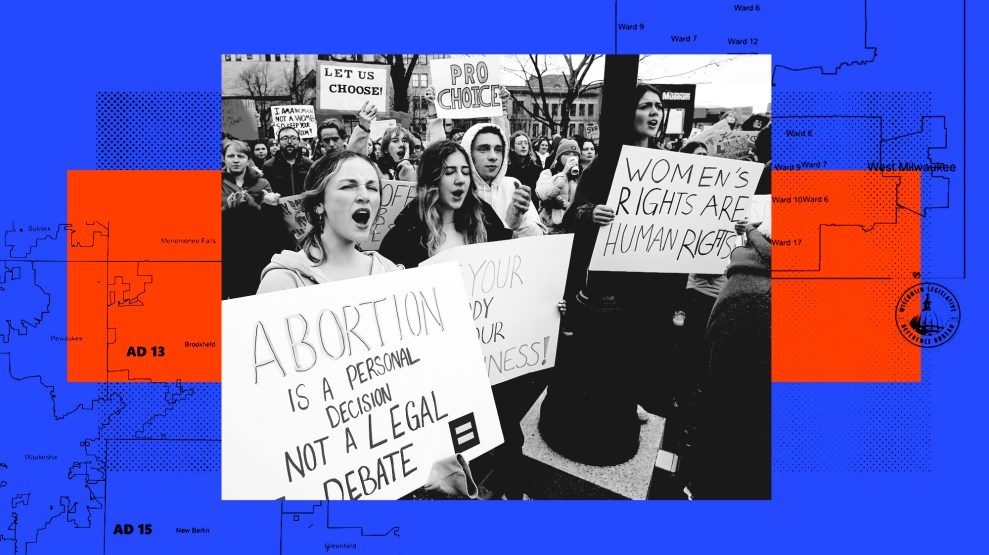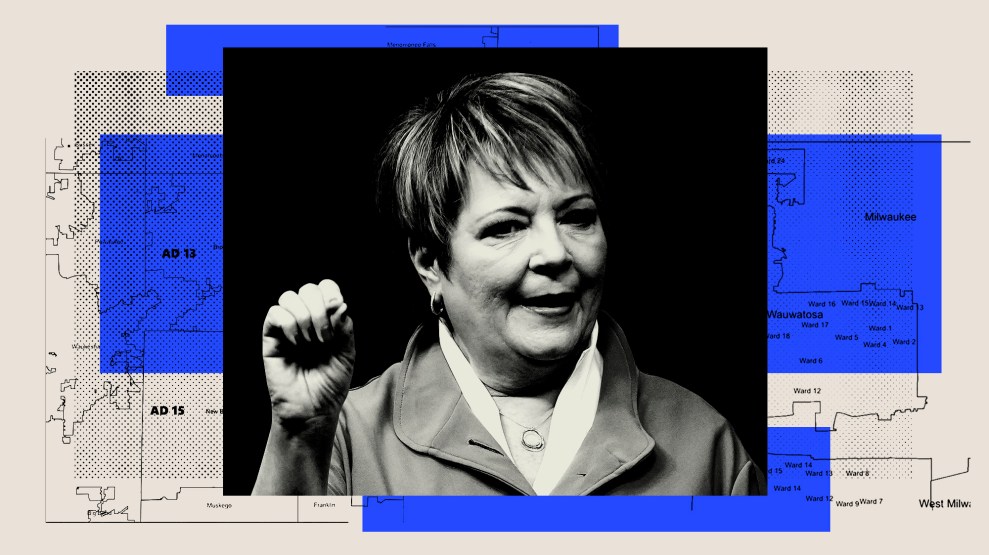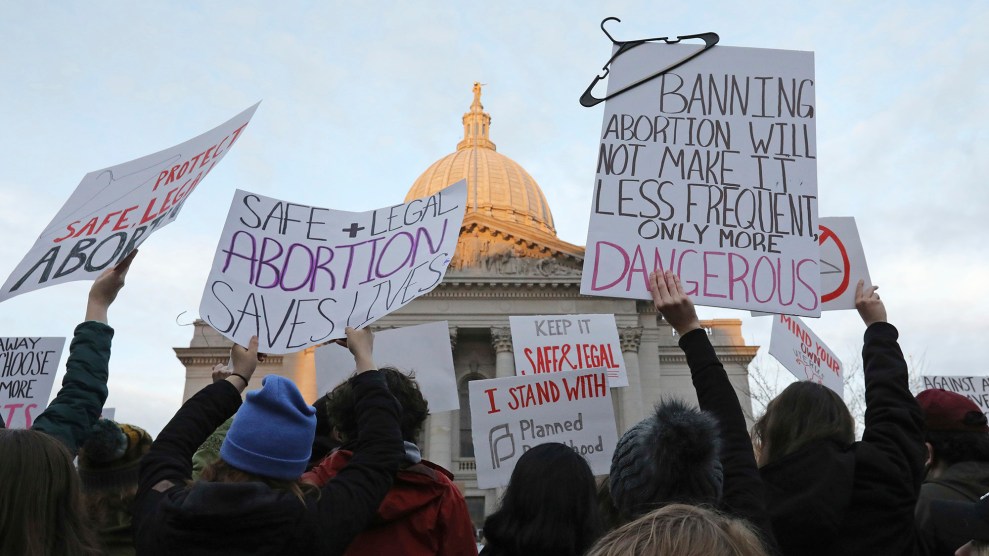
Mother Jones; Amber Arnold/Wisconsin State Journal/AP
If history were any indicator, yesterday’s Supreme Court election in Wisconsin should have been a dud. Voters notoriously stay at home when there isn’t a presidential race and when the election isn’t in November—and that’s saying nothing of the storms that barreled down on southeastern parts of the state this week, wiping out power for thousands of Wisconsinites and flooding the streets of Milwaukee.
And yet, more than 36 percent of Wisconsin’s voting age population cast a ballot in the state Supreme Court election yesterday, shattering past turnout records.
The result—the election of pro-choice Judge Janet Protasiewicz, who will tip the ideological balance of the court leftward for the first time in 15 years—is a compelling answer to the open question of whether abortion rights will remain an election-winning issue for liberals as time passes since last summer’s US Supreme Court ruling overturning Roe v. Wade. In Wisconsin, where abortions are currently unavailable except to save a patient’s life, Protasiewicz and her supporters had largely billed the race as a referendum on reproductive rights—and voters responded. As of Monday morning, with more than 95 percent of the vote counted, Protasiewicz led her opponent, conservative former Supreme Court Justice Dan Kelly, by a massive 11-point margin.
“Tonight is a turning point for the future of abortion access in Wisconsin,” Planned Parenthood President Alexis McGill Johnson tweeted.
As my colleague Ari Berman explained earlier this week, the election also had enormous stakes for Wisconsin’s deeply gerrymandered legislative maps, which have cemented Republican control of the legislature despite the nearly 50-50 split of the statewide electorate. Protasiewicz’s win, Berman writes, could even help determine the outcome of the 2024 presidential election. But a court with Protasiewicz seated could have a more immediate impact on abortion access because there is already a case winding its way through lower courts, challenging the state’s 174-year-old abortion ban.
That case was filed in late June, days after the end of Roe v. Wade thrust Wisconsin doctors into a legal no man’s land. An 1849 state law, still on the books though largely forgotten about, made it a felony to provide an abortion unless it was needed to save a patient’s life; meanwhile, more modern state laws, also on the books, only banned abortion after viability. After the US Supreme Court decision overturning Roe, it wasn’t clear which law applied in Wisconsin. If doctors chose wrong, they could face prison. So they opted to immediately stop providing abortions. Staff members at Planned Parenthood’s three Wisconsin abortion clinics went out to their lobbies and told waiting patients that they would have to continue carrying their pregnancies.
Since then, reproductive rights advocates in Wisconsin have seen a path to restore abortion access in the state, using a legal challenge to the old law. But to create the time and space for that challenge to proceed, they needed abortion supporters to win several elections.
Step one came in the midterms last November, when reproductive rights supporters rallied to defend Democratic Gov. Tony Evers and his veto power from the double threat of a GOP supermajority and a Donald Trump-backed gubernatorial challenger. Either would have empowered the state’s legislature, where deep gerrymandering has cemented Republican control, to pass a newer, clearer abortion ban with none of the old law’s ambiguities. But Evers and the Democrats prevailed, part of a nationwide wave of abortion-rights victories.
On Tuesday, abortion rights supporters achieved step two. Protasiewicz’s victory over Kelly is expected to transform the high court into favorable terrain for a legal challenge of the 1849 law. Protasiewicz, bucking norms for judicial candidates, made her support for abortion rights explicit in public comments and TV advertising.
Now the fight is onto step three: Getting the question of the old law’s validity before the Wisconsin Supreme Court. Attorney General Josh Kaul is already on it. Last summer, he filed a lawsuit asking the courts to clarify that the old law was superseded by a 1980s law allowing abortion in the first and second trimesters. “Either it is lawful to provide a pre-viability abortion, or it is not,” Kaul said in his complaint, filed in Dane County Circuit Court. “Wisconsin abortion providers cannot be held to two sets of diametrically opposed laws, and the Wisconsin people deserve clarity.”
That case has dragged on for months, and is still mired in the lower court, where the parties are battling over who has standing to sue, and who is a proper defendant. Several doctors joined Kaul’s side of the case last year, arguing that 19th century law puts medical professionals in the impossible situation of determining how close their patients must be to death in order to qualify for a life-of-the-mother exception. And while Kaul had initially filed the case against Republican leaders of the state legislature, they were dismissed after they argued they didn’t enforce the abortion ban. So Kaul instead named three local prosecutors in counties with abortion clinics as defendants. Two of those prosecutors—Ismael Ozanne of Dane County, and John Chisholm of Milwaukee—have said they wouldn’t enforce the 1849 ban, and are not vigorously fighting the case. The other prosecutor—conservative Sheboygan County District Attorney Joel Urmanski—is trying to get Kaul’s lawsuit dismissed.
Last week, Dane County Circuit Judge Diane Schlipper finally set the first hearing in the case for May 4. Whatever her ruling may be, the lawsuit is widely expected to reach the Supreme Court in the coming months. Protasiewicz takes her seat in August.
One potential wrinkle: Republicans are already talking about impeaching her for her vocal support of abortion rights and opposition to the state’s gerrymandered maps. On Tuesday—thanks to the aforementioned gerrymandering—the GOP won supermajority control of the state Senate, potentially giving them enough votes to impeach statewide officials. “If she truly acts in terms of ignoring our laws and applying her own personal beliefs, then maybe that’s something people will talk about,” Republican state senator Duey Stroebel said.












